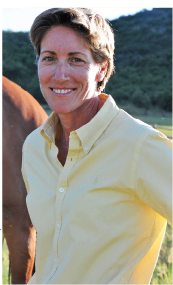Q: There is a very good trainer in my area who has a lot to offer, but she is intimidating and very blunt. I think there is a lot I could learn from her, but to be honest, I’m a little scared of her. Should I pursue riding with her? If so, what are some strategies to help me cope with her harsh criticism?
A: This question is not rare, unfortunately, and, honestly, I have been sitting here staring at the computer screen, shaking my head because a grown woman should not be afraid of another grown woman teaching her on her horse.
Life is a series of trade-offs because decisions aren’t always easy and options aren’t always clear. Equestrian training is complicated because you can’t just throw your horse in your gym bag and go to a different gym or track to give it a try. We are bound by geography, and that creates issues and tough decisions. That being said, here are some things to think about for this decision.
The first question to ask yourself with any tough decision is: What do you want to get out of this? In other words, what is the goal or objective? Having a clear picture of what you want is important because it helps guide your path. Think of the future and imagine what you want to have and feel at the end of this lesson. What will make riding with this trainer worthwhile or valuable? This is especially important to know if the experience could have some challenges like those described here.
The second question to ask yourself is: Will the benefit outweigh the cost? Every endeavor has a cost and some are more profound than others. The cost in this scenario appears to be more mental and emotional, which is not to be ignored. Our rider in this scenario mentions there is a lot she could learn from the trainer, so that looks like a good benefit. However, will you really learn from this trainer if you are stressed, anxious and intimidated before and during your ride? In humans and horses, the brain cannot process new information if it is in a stressed state. When we are stressed, the brain and body release chemicals to deal with the stress—which is interpreted as a threat to survival—even if it’s just a trainer yelling at you. The brain clicks into a mode that is designed to assess threat and either fight or flee from this threat (or the stressor) in order to survive. This is how we are wired. The way to deal with this innate response is to prepare for it so that it is not interpreted as a threat, but we’ll talk more about this in next month’s column. Some people are not intimidated or worried to ride with this trainer, so they don’t have this interfering response. But if you are, then it has to be addressed before you take a lesson with her.
So the last question would be: Can you manage your fears or anxieties of her intimidation or blunt approach enough to be present and focused during a lesson with her? Take an honest look and see if you think you can. There is no shame if the answer to this last question is “no.” Learning is a precious state for the human (and horse) brain and body, and once we realize this, we can decrease the time previously wasted not learning.
And while we’re on this topic, I actually have one last piece of advice for trainers themselves. Even if the person who trained you used fear or intimidation to teach you, it is not the best route for teaching and learning. It is actually the slowest, most energetically costly route for both you and the student. Frustration, tension, anxiety and fear prevent the brain from learning and only create a pattern of avoidance— not learning—which is why you find yourself telling the student the same thing over and over because he or she is avoiding punishment instead of finding skill. You will increase your effectiveness and business when you come from a place of enhancing and advancing. Feel-good chemicals reinforce and create better habits, so look for ways to focus on what is good or
better instead of what is wrong or not good enough.
Stay focused, stay committed and, most of all, be kind to yourself. Keep a look out for next month’s column as we continue to explore this topic.

Jenny Susser has a doctoral degree and is licensed in clinical health psychology, specializing in sport psychology. A four-year all-American swimmer at UCLA, she swam on two national teams and at the 1988 Olympic Trials. She has worked with athletes of all sports and ages—collegiate, professional, international and amateur. She was the sport psychologist for the 2010 WEG South African Para-Dressage Team and the 2012 U.S. Olympic Dressage Team. Dr. Jenny is also a performance coach with Human Performance.




